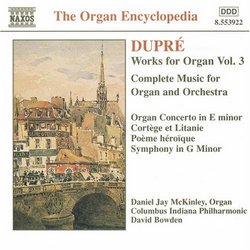| All Artists: Marcel Dupre, David Bowden, Columbus Indiana Philharmonic, Daniel Jay McKinley Title: Dupré: Works for Organ, Vol. 3 Members Wishing: 0 Total Copies: 0 Label: Naxos Release Date: 10/6/2000 Genre: Classical Styles: Chamber Music, Forms & Genres, Concertos, Instruments, Keyboard, Symphonies Number of Discs: 1 SwapaCD Credits: 1 UPC: 730099492225 |
Search - Marcel Dupre, David Bowden, Columbus Indiana Philharmonic :: Dupré: Works for Organ, Vol. 3
 | Marcel Dupre, David Bowden, Columbus Indiana Philharmonic Dupré: Works for Organ, Vol. 3 Genre: Classical
|
Larger Image |
CD Details |
CD ReviewsSymphonic works of an organist Daniel Mitterdorfer | Sydney, Australia | 09/07/2000 (4 out of 5 stars) "The Concerto, for those familiar with it, is Dupré's most recorded orchestral work, with another great local recording of it being made by Simon Preston with the Adelaide Symphony Orchestra on ABC Classics (432 529-2). The opening movement is technically very well played, but there is a very noticeable difference between McKinley's timing on the organ and that of the orchestra (the orchestra lags behind just a touch). This discrepancy disappears after the first few bars however, and the rest of the piece is carried off very well. In this piece there is one indescribable modulation that Dupré enchants his listeners with. In the score, Dupré asks that all 32' stops be drawn, resulting in a wonderful cascading effect of falling chords that change every 9th beat. This happens around 5 minutes into the second movement - it truly has to be heard to be believed. The last movement of the concerto reminds me of a Shostakovich Symphony with its strong, angular rhythms and militaristic dotted quaver rhythms. A short recapitulation brings this piece to a well executed, jolting close.Cortège et Litanie originally existed as one of a group of four piano pieces (Quatre Pièces Op. 19) and it was his American touring agent, Dr. Alexander Russell who persuaded Dupré to make two other arrangements - one for organ solo; another for organ and orchestra (incidentally, the solo version was premiered in September 1923, at a concert which also included the US premiere of the now well known Variations sur un Noël, Op. 20). This piece combines the wonderful slow melody of the Cortège, spoken in dialogues between the organ and the string section of the orchestra. The introduction of the Litanie calls for the woodwinds, with the melody spoken pianissimo by the solo flute. A gradual crescendo brings the piece to its final resting place with three long fortissimo E major chords.Poème Héroïque also exists in different versions - one for organ solo and the one recorded here. It is dedicated to those that died in the battle of Verdun, in World War I. Although militaristic in flavour, Poème really conveys a sense of the loss sustained in the war and could almost be considered a funeral march.The Symphony in G minor is very different to any of Dupré's other symphonic works in that it is considerably more difficult to follow its melodic progressions, although with time comes an appreciation, listeners shouldn't expect instant gratification from it. The final Animé movement provides an amazing conclusion to a breathtaking disc."
|

 Track Listings (9) - Disc #1
Track Listings (9) - Disc #1